
Flowers and plants
Easter Lilies
While they may be pretty, lilies are one of the most poisonous plants for cats. Petside suggests keeping them out of the house (or better yet, purchase artificial flowers). Be aware of symptoms of lily poisoning which include vomiting, lethargy, and loss of appetite. Call your vet as soon as possible if you think your pet has ingested lily. The American Society for the Prevention of Cruelty to Animals (ASPCA) says that without immediate care, cats who eat lily may develop life-threatening kidney failure within 36 to 72 hours of ingestion. (By the way, here are 50 secrets your pet wishes they could tell you.)
Poinsettias
Holiday poinsettias are also dangerous for pets, though not as worrisome as the lily. This doesn’t mean your pet should eat this pretty red Christmas decoration, since doing so will likely lead to stomach pain and discomfort, including vomiting.
The ASPCA’s compiled a searchable plant database of dangerous plants (listing over 400 items). Check it out if you are considering bringing a new plant home.

Dangerous foods
Chocolate
Chocolate might have plenty of health benefits for humans, but it’s a harmful food for pets. Petside says most adults know this, but that it’s adults’ responsibility to make sure children know, too. Keep little ones from giving chocolate to pets and do your best to supervise.
All kinds of candy–including candy wrappers
Too much sugar can give your pet a bellyache, but worse, if wrappers are swallowed, your pet risks tearing of the esophagus or intestines. Clean up as best and frequently as you can when candy is being unwrapped.
More harmful foods
Your pets should also steer clear of chewing gum, grapes, raisins, macadamia nuts, avocados, onions, garlic, salt, raw yeast dough, and fatty foods. Here are some other foods that can be seriously hazardous to your pet.
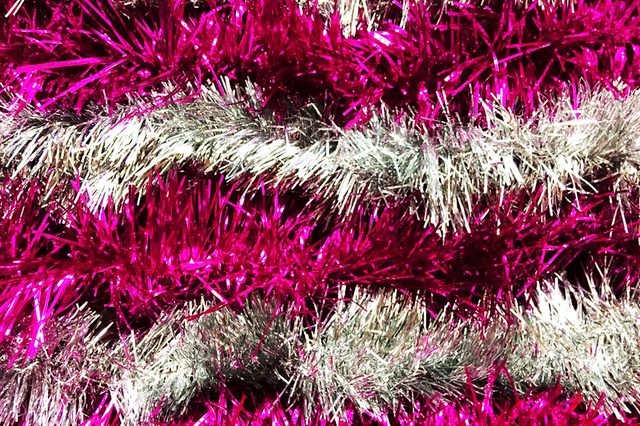
Holiday hazards
Easter and Christmas décor
Plastic eggs, if ingested, can rip tears in the digestive system. Likewise, spoiled hard boiled eggs, if ingested, can make pets ill. Easter grass and tinsel are attractive, but deadly. Pets who attempt to eat these garlands and garnishes can choke, or lethally damage their intestines. At Easter, try real grass or crumpled paper instead. At Christmas, cat-proof your tree by avoiding tinsel.
Other holiday safety tips:
New Year’s: Forego confetti and keep an eye on balloons. If they deflate, they become a choking hazard.
Valentine’s Day: Keep their paws off the chocolates and far from the flowers.
4th of July: Be mindful of fireworks and related paraphernalia.
Halloween: Use flameless candles, and keep candy out of harm’s way. (Speaking of Halloween, you won’t want to miss these adorable Halloween costume ideas for your dog.)
Thanksgiving: Throw turkey bones in the trash.
Christmas: Keep pets out of tree water, and be attentive when they show interest in ornaments, decoration hooks, ribbon, and Styrofoam.

Treacherous toys
Small, brightly colored toys hold the same appeal for pets as they do children. The problem is that they are choking hazards. Petside’s advice is to keep small toys in a place safely hidden from pets. (Don’t miss these 50 things your veterinarian won’t tell you.)

Dangerous drinks
Coffee, tea, and alcohol
Coffee and tea leaves are on the ASPCA’s list of People Foods to Avoid Feeding Your Pet, as is alcohol. Alcoholic beverages can cause vomiting, diarrhea, decreased coordination, central nervous system depression, and breathing difficulty, among other things.
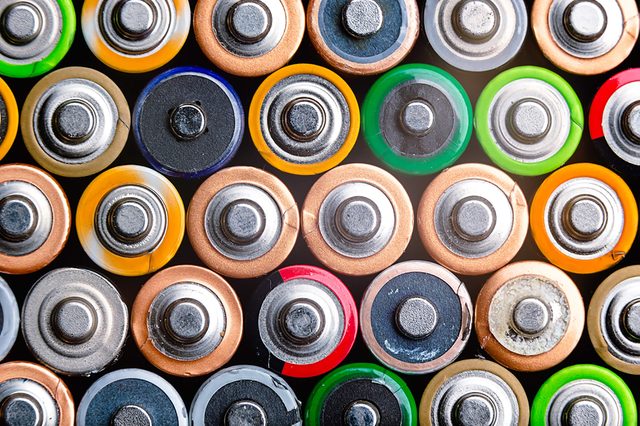
Small hazardous objects
Many small items can lead to choking—even things you would never expect your pet would attempt eating. Be mindful of buttons, small batteries, twist ties, and rubber bands. In the bathroom, keep hairpins, cotton swabs, and dental floss out of reach from your pet.
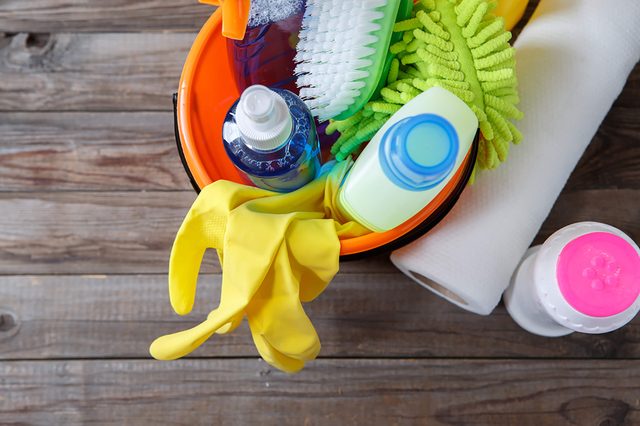
In the garage
If your pet is your shadow and frequently follows you around the house, remember that garage and storage areas need special attention, too. Keep cleaning supplies, antifreeze, fertilizer, de-icing materials and pesticides in a place pets can’t easily access. “Products containing metaldehyde, such as some slug pellets and firelighters, are extremely toxic, and should be kept away from pets,” according to Blue Cross. “Antifreeze and de-icer fluids taste sweet, but are also poisonous.” (As if having a furry companion wasn’t enough of a reason to grin, did you know that your dog actually loves when you smile?)
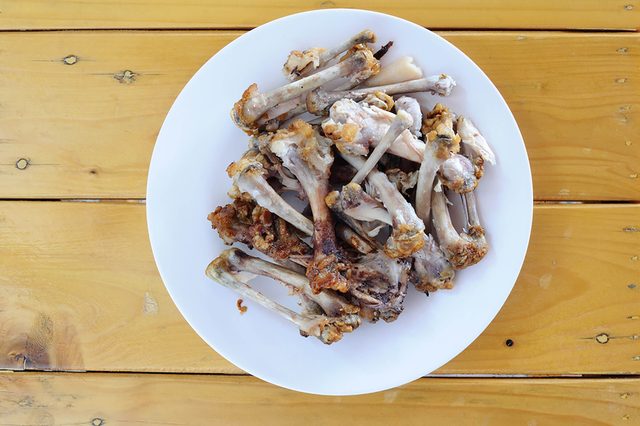
Bones
While eating meat off the bone might be tastier, if your pet gets a hold of one of those bones it could be bad news. Just like hazardous objects that might be laying around the house, it’s especially important to keep an eye on where your food leftovers end up. “Cooked bones splinter and can cut your dog’s mouth,” says Dana Humphrey A.K.A. “The Pet Lady“. If swallowed they can puncture their stomach or esophagus too.” The same goes for bone “toys” you find in pet stores—which is why you should never, ever buy one.

Sticks
Your dog might love to play fetch, but you might want to think twice before you pick up that stick outside. Sticks, especially small ones, can pose as serious choking hazards. Instead, Blue Cross suggests throwing a plastic, indestructible object that’s too big for your pet to accidentally swallow. (Here are some superpowers dogs have that prove they’re way cooler than humans.)
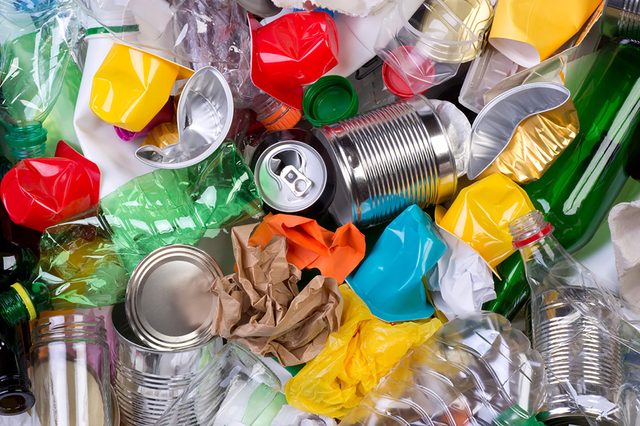
Trash cans
It’s easy to forget that your trash can is hazardous, too. Your trash can might have bones, chocolate, coffee grounds—you name it. In other words, its contents could be seriously dangerous for your pet. “Make sure your garbage pail comes with a secure lid so you don’t have to worry about Fido or Fluffy getting their paws on discarded rib bones or leftover chocolate cake,” says Dana Humphrey A.K.A. “The Pet Lady“. (Fun fact: having a pet is actually beneficial for your health—here’s why.)
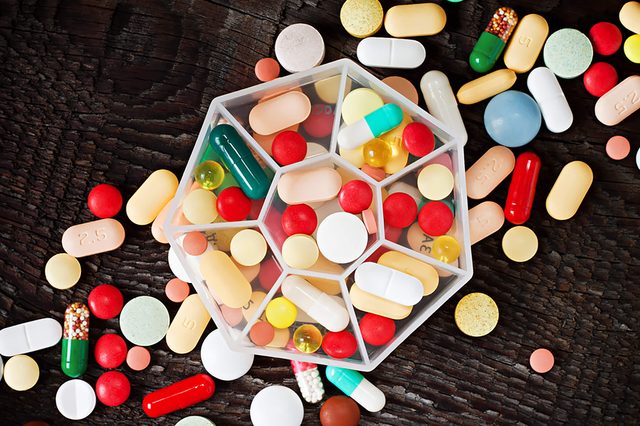
Medication
Just like humans, if you take medication that isn’t meant for you, it’s probably not a good idea. Human medication isn’t meant for your pets, and might even cause more harm than good. “Painkillers such as ibuprofen and paracetamol are particularly dangerous,” says Blue Cross. “Vitamin and mineral supplements can also be dangerous, particularly iron tablets and products containing zinc.” The same concept applies to different animals: never give your dog cat medication, and vice versa. (Make sure you follow these safety tips to keep your dog happy and healthy in the summer.)
Be sure to check out the ASPCA site for tips on keeping your pet safe and poison-proofing your home.
[Sources: petside.com, ASPCA.org, and ASPCA Pet Health Insurance.]